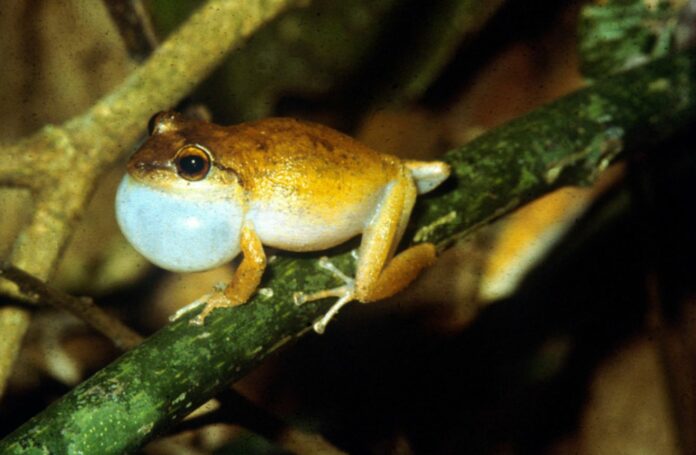The coqui frog, known for its distinctive two-note call “co-qui,” is highly sensitive to changes in temperature, and its calls have changed over the last 23 years, as discovered by a new study presented today.
Puerto Rico’s iconic coqui frog population could be at risk due to climate change, according to research by Peter Narins of the University of California, Los Angeles.
The coqui frog, known for its distinctive two-note call “co-qui,” is highly sensitive to changes in temperature, and its calls have changed over the last 23 years, as Narins discovered.
The calls have grown higher in pitch, indicating a migration of the frogs to higher elevations on the island’s mountain peaks.
The temperature shift caused by climate change may force the coqui frog population to retreat further up the mountain until it runs out of room.
Narins will present his findings today at the 184th Meeting of the Acoustical Society of America in Chicago.
More than twenty years ago, Narins captured the sounds of the coqui frog on the slopes of Puerto Rico’s El Yunque Peak. His team observed that the frogs’ calls varied according to their location above sea level. As with all amphibians, coqui frogs are particularly sensitive to fluctuations in temperature, with colder mountain peaks causing the frogs to grow larger than those living in warmer valleys, and this difference in size being reflected in their calls.
“Coqui that produced short, high-pitched calls at high rates lived near the base of the mountain, while the calls of animals living near the mountain’s peak were longer, lower-pitched, and repeated less frequently,” adds Narins.
After coming back to the mountain twenty years later, Narins and his team, which included Sebastiaan Meenderink, found that the pitch of each frog call had increased.
“In order to record a call with certain characteristics we had to move to a slightly higher altitude,” adds Meenderink. “It was as if all the animals had moved up the mountain.”
As temperatures rise due to climate change, the coqui frogs are forced to retreat up the mountain in a mini-migration. This change in their habitat indicates a troubling future for the species, as they may run out of room if they continue to move higher. The situation is dire and underscores the need for immediate action to prevent the collapse of the coqui population, which could have catastrophic consequences for the Puerto Rican ecosystem.
“For now, the consequences are not dire,” points out Meenderink. “A barely perceptible change in frog body size and call has little impact on the environment.
“However, if left unabated,” Meenderink warns, “the temperature increase will eventually cause a collapse of the coqui population, which will be catastrophic for the Puerto Rican ecosystem.”
Image Credit: K. Wells
